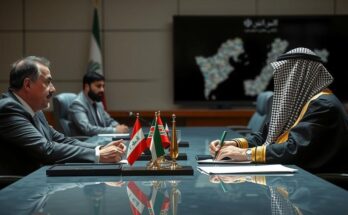In a trilateral summit in Asmara, the presidents of Somalia, Eritrea, and Egypt committed to strengthening security ties to enhance regional stability as Somalia combats the al-Shabab insurgency. The leaders emphasized sovereignty, coordination against external interference, and joint efforts to address terrorism while acknowledging potential tensions with Ethiopia, due to their military activities in Somalia and disputes over regional influence.
In a significant development for regional stability in the Horn of Africa, the leaders of Somalia, Eritrea, and Egypt committed to enhancing security cooperation during a summit held in Asmara, Eritrea. The meeting, convened by Eritrean President Isaias Afwerki, was attended by Egyptian President Abdel Fattah al-Sisi and Somali President Hassan Sheikh Mohamud. The leaders outlined their intention to strengthen ties to confront the pressing security challenges posed by the al-Shabab militant organization, which has destabilized Somalia. During their discussions, they emphasized the need for “unequivocal respect for the sovereignty, independence, and territorial integrity of the countries of the region” while also advocating for joint efforts to address external interference in their domestic affairs. The leaders underscored the critical importance of collaboration to ensure regional stability and foster sustainable development. Regarding the ongoing conflict in Somalia, where the national army is currently engaged in fighting against al-Shabab, the leaders agreed on the necessity of deepening cooperation to combat terrorism in all its forms, secure land and maritime borders, and uphold territorial integrity. This trilateral security pact may, however, create tension with Ethiopia, which has deployed troops to Somalia to combat affiliations associated with al-Qaeda despite facing diplomatic rifts with the Somalian government over Ethiopia’s intentions to develop a port within the internationally unrecognized region of Somaliland. This escalating situation follows Somalia’s recent military agreement with Egypt, which included a commitment for troop deployment in a forthcoming African Union initiative against al-Shabab. The complexity of these relations is compounded by the longstanding disputes between Egypt and Ethiopia regarding the Grand Ethiopian Renaissance Dam on the Nile River. Meanwhile, Eritrea retains a complicated relationship with Ethiopia, having previously supported Ethiopian forces during the 2020-2022 conflict against Tigrayan rebels but feeling sidelined in subsequent peace negotiations. Despite the tense geopolitical landscape, representatives from Ethiopia maintain that their relationship with Asmara is characterized by “good neighbourliness and good friendship.”
The Horn of Africa has been plagued by instability and conflict, chiefly influenced by terrorist groups such as al-Shabab, which have undermined regional security. The recent trilateral summit reflects a concerted effort by Somalia, Eritrea, and Egypt to address these challenges collectively. Given the historical tensions in the region, especially concerning Ethiopia’s military presence in Somalia and disputes over shared resources like the Nile, this agreement adds a new layer to the dynamic of regional relations. The leaders’ call for improved cooperation highlights the urgency of stabilizing an area that has experienced significant violence and unrest due to multiple factors including terrorism and contentious international relationships.
The summit between Somalia, Eritrea, and Egypt marks a pivotal step towards addressing the ongoing security threats in the Horn of Africa, particularly from al-Shabab. By prioritizing cooperation and respect for national sovereignty, the leaders aim to bolster regional stability, though potential ramifications for relations with Ethiopia remain a concern. Through mutual support and coordinated efforts, the trio hopes to establish a framework conducive to both security and sustainable development in the region.
Original Source: www.aljazeera.com




